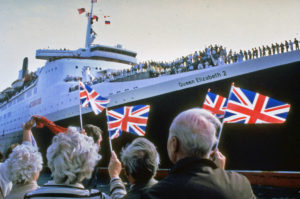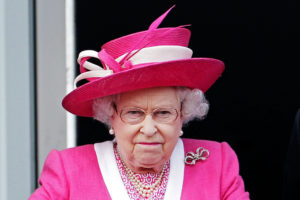It was the spring of 2002, and in the Guardian, the satirist John O’Farrell was licking his lips at the inevitable failure of the Queen’s Golden Jubilee. “Tragically,” he wrote mockingly, “this joyous anniversary seems to be regarded with widespread cynicism and apathy… Street parties, like the royal family, are just a bit out of fashion… So wave that flag and open that champagne. Because for a decade now, nobody has cared about the monarchy.”
He was right — or seemed to be. Only a few weeks earlier, the same paper had reported “panic at the palace over the lack of street parties”. The official Golden Jubilee website, exulted the Guardian, “bears a forlorn look. So far it lists a golden jubilee snooker and pool tournament in Plymouth, the planting of an oak in the village of Oxhill, Warwickshire, the planting of a jubilee garden at Cranmore infants’ school in Shirley, Birmingham, the placing of small fountains all over London — and precious little else.”
And then — what a comeback! When the Queen’s Jubilee weekend finally rolled around, it turned out that the Royal Family was only too fashionable after all. Two million people applied for tickets for the classical Prom at the Palace. A further million people packed into the Mall to see the handsomely coiffured Brian May kick off the Party at the Palace, while another 200 million watched on television. And although the Sex Pistols re-released “God Save the Queen” for the occasion, their hearts weren’t really in it. As a youngster, admitted the erstwhile Johnny Rotten, he had taken exception to the Queen’s “Mother Superior” tone. But “they’ve mellowed that out. Charles is a really good-natured bloke who talks to plants. There’s nothing wrong with that.”
There have been eight jubilees since the first, held for George III in October 1809, and the story has always been the same. For months everybody predicts a humiliating fiasco. Nobody cares, and nobody bothers to organise anything. Then at the last minute, to the horror of university lecturers and Twitterstorians across the land, millions of strange people come crawling out from beneath their rocks, waving their Union Jacks and openly daring to feel good about their country. This, of course, is how Nazi Germany started.
Like all great British institutions, the first Jubilee was basically an exercise in sticking it to the French. The Napoleonic Wars were in full swing, the British campaign in Flanders had become badly bogged down and Wellington was slogging his way across Spain in the Peninsular War. So the country needed cheering up, and the beginning of George III’s 50th year on the throne provided the perfect opportunity.
Although there was virtually no central organisation, most towns were happy to plan their own celebrations, with local landowners footing the bill. There were ox-roasts and fetes, feasts and fireworks. People staged sword-fights and fired muskets, while the elderly king went to a service of thanksgiving. And there were special pardons for debtors, deserters and prisoners of war — though not, of course, if they were French.
For poor George himself the Jubilee was something of a last hurrah, since a year later he succumbed to madness. He spent the rest of his days endlessly weeping and tying and untying handkerchiefs, which is how most Guardian columnists are planning to spend the Queen’s Platinum Jubilee next week. But the success of the event set a precedent, and in 1887 Lord Salisbury — not exactly an obvious party-going Prime Minister, but appearances can be deceptive — decided that Victoria should have a Golden Jubilee too.
At first the monarch was less than keen, fearing (ironically) that people would think a national celebration rather too Napoleonic. But Salisbury prevailed, and the result was a huge success, with vast crowds lining the streets of London to cheer Victoria on her way to Westminster Abbey.
There was, however, a remarkable twist. To mark the occasion, Salisbury decided to organise a false-flag terrorist plot, his agents encouraging a group of Irish-American Fenians to cross the Atlantic with some dynamite, purportedly to blow up both the Queen and Salisbury himself. Obviously the PM never intended the bomb to go off: the plan was to roll up the Fenian network in Britain and discredit sympathetic Irish nationalist MPs. Even so, the head of the Metropolitan Police’s “secret department” advised his own children not to attend the Jubilee service, just in case. Has Boris Johnson planned something similar this year? Given his organisational skills, let’s hope not.
All this was merely a curtain-raiser for the Woodstock of royal blowouts, the very acme of patriotic knees-ups, the Diamond Jubilee of June 1897. Not for nothing does this provide the centrepiece of Jan Morris’s great book on the apogee of imperialism, Pax Britannica, since it was explicitly conceived by the Colonial Secretary, Joseph Chamberlain, as a “Festival of the British Empire”.
There were Jubilee events in every corner of the earth, from Ireland and India to Singapore and the Seychelles. And the London parade was the most spectacular the capital had ever seen. In Morris’s words: “There were Hussars from Canada and Carabiniers from Natal, camel troops from Bikaner and Dyak head-hunters from North Borneo… There were Malays, and Sinhalese, and Hausas from the Niger and the Gold Coast, Jamaicans in white gaiters and ornately embroidered jackets, British Guiana police in caps like French gendarmes, Cypriot Zaptiehs whose fezzes struck so jarring a chord that some of the crowd hissed them, supposing them to be Turks, and a jangling squadron of Indian lancers led by a British officer in a white spiked helmet.”
Not surprisingly, Fleet Street’s finest were in a state of patriotic ecstasy. It was “a pageant which for splendour of appearance and especially for splendour of suggestion has never been paralleled in the history of the world”, reported Her Majesty’s Daily Mail, with “every man such a splendid specimen and testimony to the GREATNESS OF THE BRITISH RACE that there was not an Imperialist in the crowd who did not from the sight of them gain a new view of the glory of the British Empire”.
And equally unsurprisingly, do-gooding citizens of the world hated it. “Imperialism in the air,” Beatrice Webb lamented in her diary, shuddering at the sight of “all classes drunk with sightseeing and hysterical loyalty”.
Even over this greatest of all Jubilees, though, there was a shadow. Britain might have been Top Nation, but foreign rivals — the United States, Germany, even Russia — were catching up fast. When Joseph Chamberlain organised an imperial conference a few days after the jamboree, the other colonial delegates rejected his suggestion that they should form a permanent imperial federation, with a special council to coordinate their policies. And when Rudyard Kipling was invited to publish a Jubilee poem in The Times, the result — “Recessional” — read more as a prediction of imperial decline than a celebration of imperial glory:
Far-called, our navies melt away;
On dune and headland sinks the fire:
Lo, all our pomp of yesterday
Is one with Nineveh and Tyre!
Judge of the Nations, spare us yet,
Lest we forget — lest we forget!
Kipling was right, of course. By the time of the next royal binge — George V’s Silver Jubilee of May 1935 — the tone was very different. Royal houses had crumbled all over Europe, Communism and Fascism were in their pomp and Britain was only just emerging from the Depression. The previous autumn, the Nazis had held their most spectacular Nuremberg rally yet, filmed by Leni Riefenstahl for Triumph of the Will. But George’s Jubilee could hardly have been more modest. There was plenty of bunting, of course, and there were thousands of street parties. But the imperial fervour was much reduced, and nothing better summed up the mood than the advent of the ancestor of coronation chicken — a concoction called Jubilee chicken, made with mayonnaise and curry powder.
It was a Pooterish dish for a Pooterish king, an unassuming, unexciting man who had never knowingly said an interesting or clever thing in his life. The Germans had their Führer, the Russians had their General Secretary, and we had our King-Emperor, who liked stamp collecting and had very strong views about where you should crease your trousers. Quite rightly, though, people admired him for it. “I’d no idea they felt like that about me,’ said George, after crowds cheered him in the East End. “I’m beginning to think they must really like me for myself.”
If 1897 was the peak, the nadir was probably the Silver Jubilee of 1977. Most ordinary people actually had a tremendous time; and with record sales of Jubilee-themed jewellery, t-shirts, beer mugs, jeans, even egg timers, thermometers and ashtrays, Britain’s tat merchants were in dreamland. Even so, the fact that it rained for most of the day rather summed the whole thing up. Inflation was rampant, Jim Callaghan’s government had just cadged a record bailout from the International Monetary Fund, and the newspapers were generally full of doom and gloom. “The popular imagination can no longer feed on the glories and wonders of empire,” lamented The Times. “Nor, it has to be admitted, does the Britain of 1977, relieved of almost all its imperial baggage, present the sort of spectacle to light in the mind the bonfires of national rejoicing.”
Musically, the lowlight wasn’t the Pistols’ punk anthem, but the truly terrible “unofficial” Jubilee single by the former Bonzo Dog Doo-Dah Band member Neil Innes (sample lyrics: “Sailing in the yacht Britannia / Nowhere in the world would ban ya’ / Or your Royal Family”.) And while Kipling’s “Recessional” had at least been printable, Philip Larkin’s Jubilee poem, which he showed only to a few friends, is unlikely to feature on too many university reading lists today:
After Healey’s trading figures
After Wilson’s squalid crew
And the rising tide of niggers
What a treat to look at you!
By these standards, the Jubilees of 2002 and 2012 were positively joyous. And no doubt next week’s party will be fun, too. My 10-year-old son reports that his schoolmates are all very excited about it. Each class is going to dress up as a different Commonwealth country, and his own class has chosen Mozambique. As long as they don’t get Justin Trudeau to provide their costumes and make-up, what could possibly go wrong?
But what if, like Beatrice Webb and similarly miserable drips throughout history, you can’t stand the monarchy and aren’t looking forward to the Jubilee? Well, I have a consolation for you. Even if, God forbid, Prince Charles succeeded tomorrow, it’s statistically very unlikely that he’ll be around for a Silver Jubilee of his own. Even William, who is now almost 40, will probably do very well to mark his 25th year on the throne.
So this may very well be the last Jubilee most of us will ever see. Unless, of course… we change the rules and have them every four years, like World Cups. It would drive the Guardian mad, of course. Let’s do it.
Disclaimer
Some of the posts we share are controversial and we do not necessarily agree with them in the whole extend. Sometimes we agree with the content or part of it but we do not agree with the narration or language. Nevertheless we find them somehow interesting, valuable and/or informative or we share them, because we strongly believe in freedom of speech, free press and journalism. We strongly encourage you to have a critical approach to all the content, do your own research and analysis to build your own opinion.
We would be glad to have your feedback.
Source: UnHerd Read the original article here: https://unherd.com





